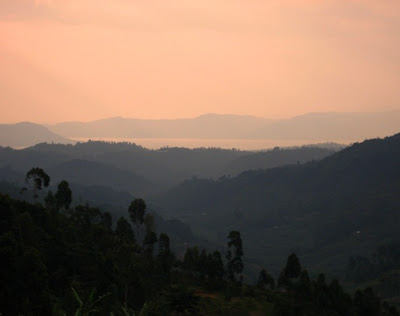It’s easy to get swept away by tourists’ tales of gorilla tracking while staying in comfy lodges serving chicken and chips, but I decided to head to the
Looking down on Banda village
This community lives right on the edge of Nyungwe and has depended on it for fuel, building materials, medicine and for food. There are now efforts to stem this dependence and provide for these uses by means other than reducing the size of the remaining forest.
Camp site on edge of forest
As I struggled down with my wee rucksack full of guide books, a line of men carrying 5 gallon cans on their heads passed us….. going upwards. Making a living here involves hard work, very hard work. What was in the cans was the traditionally made banana beer, which will sell at the top of the hill and an hour bus ride away for about 40p a pint. They’re not shy of a banana or two in Banda and the brewing process, after ripening, squeezing and with the aid of some sorghum only takes two days (Cue banana montage).
Bananas from various angles
Village life is fascinating and once I laid eyes on Banda and the campsite I didn’t really care about birds and monkeys in the forest. The red soils are used for growing all manner of veggies including peas, sweet potatoes and of course bananas. But the soils get packed together and breaking them up for planting is a tough task.
Apparently I was fascinating too – every time you lift your head there’s a posse of little kids waiting to see what Umuzungu will do next
You know when you’ve been Umuzungu’d
Cesar, who helps run the project, took me round to see beekeepers, a traditional smithy, banana beer makers, the market and even the town’s micro-hydro project. These folks are partners in a co-op and they get a share of the profits afterwards so it all goes back into the community, and other goofy looking characters like me hopefully get a warm reception. Hopefully plenty more will come.
Brave young lad in tree next to traditional beehive
Cesar partaking in a refreshing banana beer at the local shop
Thatching roof on traditional house
Market square on another day – beans drying in sun. 2 men are checking electoral register for upcoming election (betting man’s money is on Paul Kagame again).
Blacksmithery house – Smith wasn’t at home
Traditional medicine man’s house and garden – Doc wasn’t home either
Bees were at home
Jolly battery charging man was home at the hydro station. This is the only power the village has (funded by the Wildlife Conservation Society) and again involves quite a walk with a hefty weight. I’m sure it won’t be too many years before power and a decent road come to town. Who knows, then you might all be able to get a Banda banana beer. I can recommend it!
There are quite a lot of projects on the go in Banda. The local nursery school has been a big one. There are a lot of kids here, with about 2,000 of the 5,000 population being schoolies.
The new school ensures the poorest of these get a place. They’re all taught in English now and every five year old can say “Good morning teacher” (whatever time of day it is) and sing “Number one number one where are you, here I am here I am how do you do” very impressively (sadly video won’t load!).
The school has a milking cow to get some milk into the kids’ porridge and has a whole nursery of avocado trees ready to go (plant pots ingeniously made of banana leaves).
They get fruit off of them within 2 years and every child is already an expert tree climber for harvest time
Justin the proud nursery school headmaster outside his new school
There’s also an eco-lodge about to be built up on the hill by a






























































